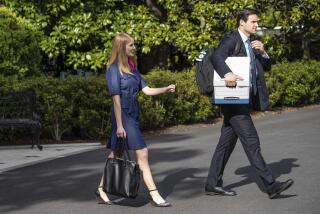Associate Testifies Deaver Was Involved in Arranging for Korean to Meet Reagan
- Share via
WASHINGTON — Contrary to what he told a congressional committee under oath, former White House official Michael K. Deaver was directly involved in arranging for a South Korean trade official to hand a letter to President Reagan at the White House two years ago, a lobbying associate of Deaver testified Friday at Deaver’s perjury trial.
Deaver, whose consulting firm held a $475,000 contract to lobby for South Korean trade interests, had told the House panel that he did nothing to facilitate the Oct. 2, 1985, meeting at which Kim Ki Hwan delivered a letter to Reagan from Korean President Chun Doo Hwan.
In reality, Deaver originated the idea, his firm helped write the letter and Deaver conferred with the U.S. ambassador to South Korea about having Kim give the letter to Reagan, according to testimony in federal court by Doral S. Cooper, an associate in Deaver’s now-defunct firm.
End of Third Week
The testimony was among the most damaging elicited by independent counsel Whitney North Seymour Jr. and his staff as the trial before U.S. District Judge Thomas Penfield Jackson ended its third week.
Cooper said she told Deaver the day before the Reagan-Kim meeting that she was concerned because it had not been set up yet. But that evening, she said, another Deaver associate told her that the meeting had been arranged.
In testimony last week, former National Security Adviser John M. Poindexter said that Deaver had called him late one afternoon “in the fall of 1985,” asking for his help in getting Kim on the President’s schedule. Poindexter said that he contacted another National Security Council aide, Gaston Sigur, who said there “was already a request working and he would follow up on it.”
Picture of Meeting
While Cooper was on the stand, prosecutors projected on a movie screen a color photograph of Kim delivering the letter to Reagan in the Oval Office. The picture was snapped by a White House photographer during the two-minute meeting.
In the letter, Chun told Reagan that Korea was opening up more markets to imports.
Addressing another count in the indictment against Deaver, Cooper testified that she and Deaver met with Sigur on Jan. 15, 1986, to ask that the United States refrain from pressing additional unfair trade claims against the South Korean government.
Deaver had told the House Energy and Commerce subcommittee on oversight and investigations on May 18, 1986, that “I don’t recall” any such contacts with NSC officials. Sigur was a Far East specialist on the council’s staff.
Former Yeutter Aide
Deaver, a longtime confidant of Reagan, left his job as deputy White House chief of staff in May, 1985, to form a public relations and lobbying firm. Cooper joined the firm after resigning as a top assistant to U.S. Trade Representative Clayton K. Yeutter.
Federal ethics law prohibits former high-ranking officials, such as Deaver, from contacting their former government colleagues on behalf of a business client for a year after they leave federal service.
However, Deaver is not charged with any direct violation of the law--only with lying about his actions to the House panel and a federal grand jury.
Defense lawyers contend that Deaver never intended to lie but gave inaccurate answers to investigators only because his memory was impaired by alcoholism.
Asked About Trip
During cross-examination, assistant defense attorney Randall J. Turk asked Cooper if she had seen Deaver drinking on a trip they took to the Far East shortly before Kim delivered the letter to Reagan.
She said she believed that he drank white wine on the plane and at various dinners they attended.
Assistant independent counsel George F. Hritz asked her if Deaver had been drinking at a breakfast in Seoul where he discussed the proposed Chun letter to Reagan with U.S. Ambassador Richard Walker.
She said she did not remember.
Similarly, she said she did not recall Deaver drinking during a meeting with Kim about delivering the letter to Reagan.
More to Read
Sign up for Essential California
The most important California stories and recommendations in your inbox every morning.
You may occasionally receive promotional content from the Los Angeles Times.













